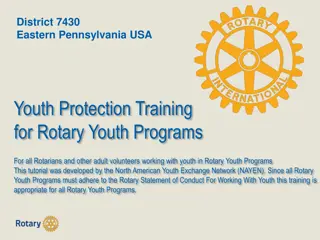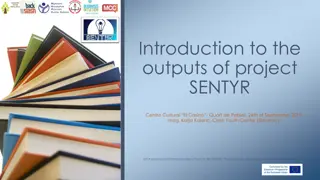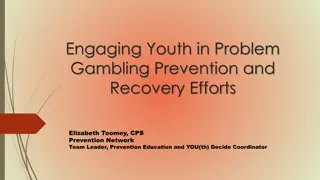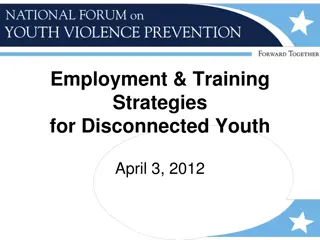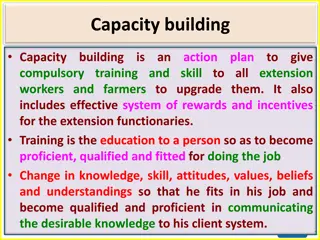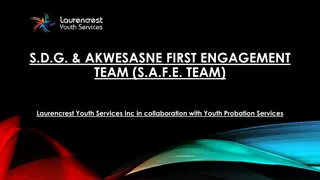Exploring Education and Training Pathways of Youth Workers in Europe
This study delves into the diverse pathways of education and training for youth workers in Europe, focusing on the essential skills, knowledge, and specializations needed for effective youth work. It discusses the importance of flexibility, accessibility, and understanding in preparing youth workers to navigate the complexities of working with young individuals in various environments. The exploration spans from foundational skills to academic and policy connections, highlighting the unique role and contributions of youth work in shaping and supporting youth development across different societal contexts.
Download Presentation

Please find below an Image/Link to download the presentation.
The content on the website is provided AS IS for your information and personal use only. It may not be sold, licensed, or shared on other websites without obtaining consent from the author. Download presentation by click this link. If you encounter any issues during the download, it is possible that the publisher has removed the file from their server.
E N D
Presentation Transcript
EDUCATION & TRAINING PATHWAYS OF YOUTH WORKERS IN EUROPE TOWARDS MORE COHERENT AND FLEXIBLE ROUTES HOWARD WILLIAMSON & MARKO KOVACIC HELSINKI, FINLAND FEBRUARY 2019
OUR AMBIVALENCE Whose agenda? Finland CoE Recommendation Youth work (in Europe?) European youth work Higher education? Lower education ? Community-based learning Celebrating diversity all Finding common ground?
STARTING GRID Why do you workers need skills? What are the basic skills youth workers need? How to train youth workers? Blessed and cursed by diversity (in youth work education and training) Broad agreement on SPACES & BRIDGES Three steps to heaven? [the road to hell is paved by good intentions!]
1 STAYING GROUNDED THE ESSENTIALS OF YOUTH WORK? Most youth workers are volunteers education and training has to be flexible and accessible: what are the basics or essentials ? The youth worker DOING SKILLS (being able to do the job) The young person in their local environment home, school/work, leisure time, peer group [local-national-international] [routine-developmental-experimental] Core learning requirements: safety, well-being, security Essential practice dimensions: Association, Activities, Advice
2 BUILDING INTELLIGENCE THE SCIENCE OF YOUTH WORK Connecting practical experience with wider academic and policy understanding Reflective practice / praxis The youth worker KNOWING KNOWLEDGE (understanding why you do the job) The young person s make up the psychology of adolescence/the sociology of youth group [local-national-international] [routine-developmental-experimental] Core learning requirements e.g. policy influence, strategic fundraising, differentiating needs and issues young people face [equality and discrimination] Essential practice dimensions: , Autonomy, Advocacy, Awareness
3 MASTERING A CRAFT THE ART OF YOUTH WORK Specialisms issues, groups, policy domains: the distinctive role of youth work Histories and contemporary expectations and contributions The youth worker BEING IDENTITY/DISTINCTION (confidence in our own skin and in relation to others) The young person in society and the world social, economic, political and cultural place and space group [local-national-international] [routine-developmental-experimental] Core learning requirements e.g. European and international context, systemic awareness, making the connections Essential practice dimensions: Exploration, Innovation, Youth work beyond borders This level of confidence demands the application of courage!
THE TIES THAT BIND Principles and purposes Quality development Blended learning Flexibility and individualisation Ethics Mentoring, supervision, coaching non-managerial supervision and support Debate about recognition, accreditation, endorsement and validation Policy documents (local-national-international-global)





